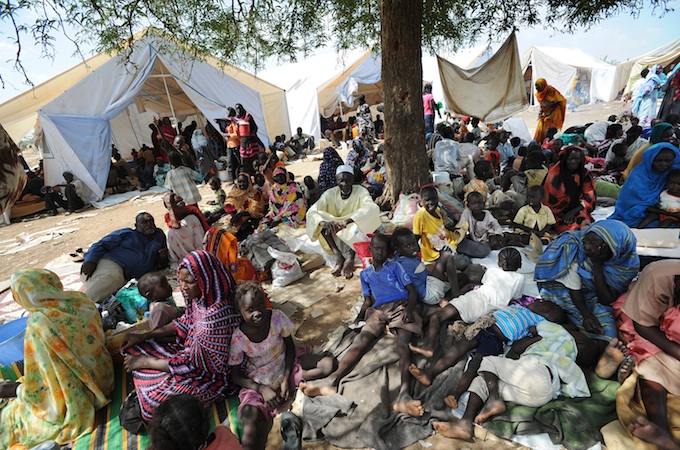Sudan bans main opposition party
Khartoum shuts offices of SPLM-North associated with former southern rebels and arrests officials.

 |
| Thousands of people have been displaced by conflict in South Kordofan state, an SPLM-North stronghold [EPA] |
Sudan has banned the country’s main opposition party, closed its offices and made sweeping arrests across the country, its secretary-general said on Sunday, as fighting continued in a key stronghold of the SPLM-North.
“The [ruling] National Congress Party has banned the Sudan People’s Liberation Movement (SPLM) in all states and arrested a large number of its members and seized property and documents belonging to it in different states and localities,” Yasser Arman said in a statement.
Arman gave a detailed list of more than 10 party members and local leaders who have allegedly been arrested since Tuesday in various states, including West Darfur, Gezira, North Kordofan and Sennar.
“What is happening now, in different towns and villages in Sudan against members and leaders of the SPLM, is something that was organised and planned over a long period, with the aim of … eliminating the SPLM as a major national and democratic force in north Sudan,” Arman said.
Other party members said the government shut down all the offices of the party’s northern branch, including the one in Khartoum, on Saturday.
“There is no party that is called the SPLM in Sudan and it has no right to carry out political work because it is illegal,” Rabia Abdelati, adviser to the information ministry, told the Reuters news agency.
The ex-rebel movement is now the ruling party of South Sudan, which formally split from the north on July 9, after decades of devastating conflict.
Sudan’s deputy information minister, Sanaa Hamad, confirmed that Khartoum had declared the SPLM illegal in the north, saying it was not a legally registered political party following southern secession.
“But this situation will not have an impact on the members of the party as individuals … The only people who have been arrested were involved in illegal activities,” she told the AFP news agency.
Blue Nile clashes
The move against the SPLM-North comes shortly after deadly fighting erupted in Blue Nile state between the Sudanese army and ex-rebel troops loyal to the Malik Agar, the elected governor and party chairman.
Sudanese President Omar al-Bashir sacked Agar from his job on Friday and appointed a caretaker military leader after declaring a state of emergency.
Fighting continued in Blue Nile on Sunday, with Abdelrahim Mohammed Hussein, Sudan’s defence minister, quoted by state media as saying that a major battle took place in Dindiro.
Earlier, the UN said 16,000 people – the entire estimated population – were reported to have fled from the flashpoint town of Kurmuk across the border into Ethiopia.
The Khartoum government has shown itself increasingly determined to assert its authority within its new borders following southern secession, moving to disarm troops outside its control.
Bashir said on Sunday that the Sudanese government would “deal with any military or security violations by the SPLM”, in a statement published by the official SUNA news agency.
In his first public remarks on the conflict, he added that the people of Blue Nile had rejected the option of self-government in “popular consultations”.
The Carter Center, a US monitoring group, said last week that the consultations process in Blue Nile had stalled after their deadline was formally extended in July.
South Kordofan tension
Khartoum blames the south and the SPLM for violence in the Blue Nile and South Kordofan states as well as other areas along the boundary, where fighting since Thursday has killed more than 20 and driven many from their homes.
SPLM officials say Khartoum is to blame.
Analysts say Sudan’s government in Khartoum is trying to strike against the rebels in South Kordofan and Blue Nile before they become a serious political and military threat.
Both states are located north of Sudan’s new international border, but were key battlegrounds during the north-south civil war and have large numbers of SPLM-North supporters and troops who fought alongside the ex-southern rebels.